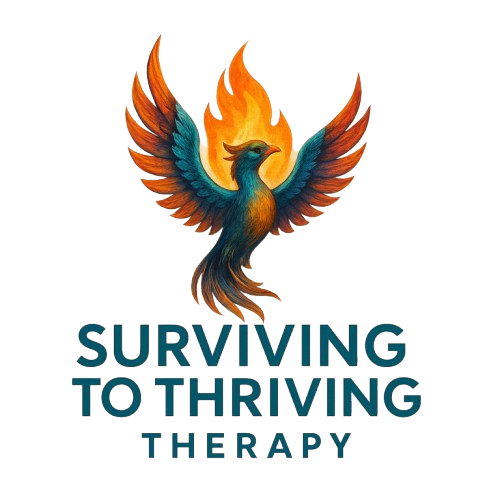Creating Hope: Supporting LGBTQIA+ Suicide Attempt Survivors
Utah has one of the highest suicide rates in the country, and it’s heartbreaking. While we know far too many people here are dying by suicide, we still don’t fully understand all the reasons why Utahns are at greater risk—or why some people see suicide as their only way out of pain and stress.
At Surviving to Thriving Therapy, our mission is to meet people where they are emotionally, mentally, and psychologically. We welcome people from all walks of life—both inside and outside the LGBTQIA+ community, including parents of LGBTQIA+ youth. We work with a wide range of concerns, like anxiety, social phobia, eating disorders, workplace stress, homelessness, depression, gender identity, and coming out.
Through hundreds of hours of conversations with LGBTQIA+ individuals, we’ve heard loud and clear: people thinking about suicide need more support. Therapy gives people a space to share their experiences, feel understood, and learn tools for healing. Together, we’ll work on addressing the factors that drive suicidal thoughts and behaviors, learn to cope with ongoing suicidal thinking, access resources, and build hope.
We’re deeply committed to preventing suicide in the LGBTQIA+ community by reducing risk factors and strengthening resilience. In recent months, public concern about suicide among LGBTQIA+ individuals has grown—rightfully so. The reasons people attempt suicide are complex and personal. One former client told us, ‘My parent said they prayed, and God told them I should kill myself rather than be gay.’ Stories like this are devastating, but they also make it clear how much LGBTQIA+ affirming suicide prevention therapy is needed.
The most important thing to know about suicide is that it can be prevented. At Surviving to Thriving Therapy, our goal is to provide greater support to people in emotional pain and fight the stigma surrounding mental illness. Everyone can help reduce suicide deaths by learning the warning signs, offering support, and helping people know they’re not alone.
Warning Signs:
Threatening, talking about or planning suicide
Giving away possessions
Feeling hopeless/helpless
Depression/irritability
Increased drug/alcohol use
Making out wills
Despairing texts or posts
Feelings of failure or shame
Social withdrawal or isolation
Risky behaviors
What to do
Express concern
Listen without criticism
Take threats seriously
Ask about suicide plan
Remove lethal means
Inform family/friends
Seek professional help
Call 911 or the Crisis Line
Where to seek help
All Utah Counties, 24 Hours:
National Suicide Prevention Lifeline (800) 273-TALK (8255)
Mobile Crisis Outreach Team - Salt Lake County
801-587-3000
://www.sosa@utahpridecenter.org
Men Support Group: http://www.Sean@utahpridecenter.org
Man Therapy: http://www.mantherapy.org
Suicide Prevention Courses: http://www.qprinstitute.com/
National Alliance on Mental Illness (NAMI) Utah
801-323-9900
Toll Free 877-230-6264
Utah Suicide & Crisis Hotline
http://www.suicide.org/hotlines/utah-suicide-hotlines.html
Ogden
Weber Mental Health
Serving Davis, Morgan, & Weber Counties
Crisis/Suicide Prevention Hotline
801-625-3700
Orem
Crisis Line of Utah County
801-226-4433
Provo
Wasatch Mental Health
Crisis Line
801-373-7393
Salt Lake City
Valley Mental Health
Serving Salt Lake, Summit & Tooele Counties
801-261-1442
Permission to Grieve: For Survivors of a Loved One's Suicide
http://health.utah.gov/vipp/pdf/Suicide/grievebooklet_final0605.p
